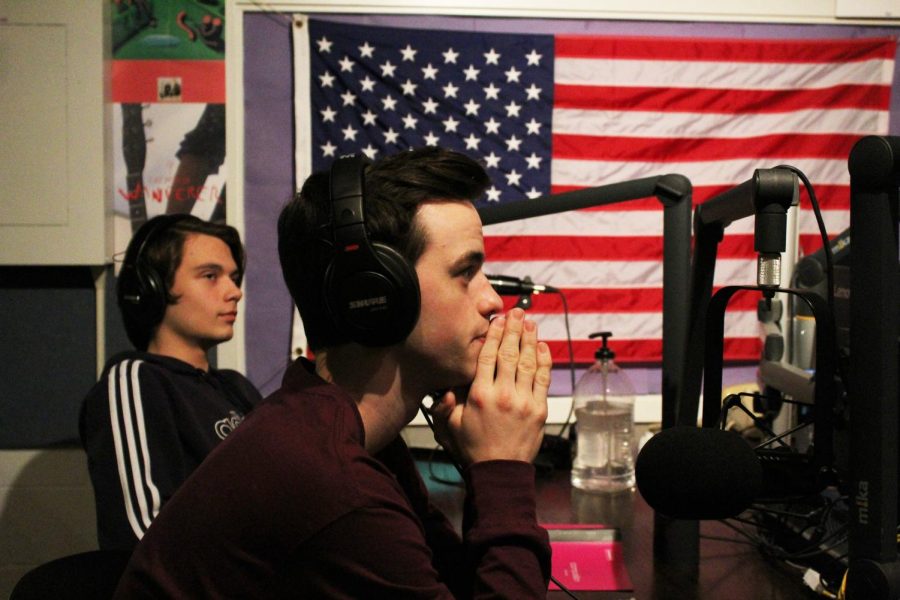Broadcasting program celebrates milestone
On Air: For their Wednesday afternoon radio show, seniors Will Kasher and Adam Szczerbowski broadcast live from WGBK’s Studio K. Photo by Cali Wilkinson
March 18, 2022
For the past 40 years, WGBK, South and North’s combined radio station, has been the voice of the community, offering radio shows, sports commentary, student-selected music, and commercial programming. Under the guidance of supervisor Dr. Daniel “Doc” Oswald, the radio program has not only flourished, but defied the odds against other streaming platforms and grown listenership and programming diversity, senior Billy Fradin explained.
Oswald credits his students for much of the radio program’s success and for running the program self-sufficiently. He said many students play key roles in running WGBK from production direction, sourcing material, and specifics of the programming. Oswald sees the station as a student-run enterprise, and applauds the students for coming up with the bulk of the ideas and producing all the content broadcasted to the Glenbrook community.
“I think my students have become much more aware of the responsibility they have to connect with as broad an audience as they possibly can,” Oswald said. “They’re aware of the impact of the words they say and the ideas that they share. They’re also much more open to hearing other people’s points of view and exploring new and interesting content.”
From Oswald’s perspective, the station’s accessibility allows for the program to stay consistently relevant. In the 1980’s, WGBK started as the WMWA radio station, run by a local church and volunteers. South students eventually started hosting music shows on Fridays and broadcasting sporting events on the weekends, leading to it being bought by the district and transformed into WGBK, Oswald explained. He believes the accessibility of the broadcasts is why WGBK has expanded its audience and stayed connected with the community.
“Radio is not something that relies on one to have a certain amount of affluence, wealth, or opportunity,” Oswald said. “Radio is a tool that can be used to reach people everywhere.”
Fradin, managing director of WGBK, appreciates using his radio show on Wednesdays from 7 to 8 p.m. as a creative outlet and a way to have fun. He treasures this unique experience for allowing him to express his love for music and talking on the radio.
“I think [WGBK is] a cool space to do what you want with your time and I’m really passionate about music, so I spend most of my time [on air] playing music,” Fradin said.
Fradin acknowledged the troubles the radio program had when the Covid-19 pandemic started, and the drastic change from the dynamic classroom environment to being online. The ability for the program to grow and evolve over the past 40 years leads Fradin to believe that it will continue to embrace students’ talents for years to come, despite any obstacle.
“The program [being] 40-years-old in and of itself is a big accomplishment and shows how the program is successful and students want to engage with it,” Fradin said.
Riaz Gillani, Special Education Teacher, was a part of the radio program as a South student in 2015. Gillani cherishes the community that Oswald and so many others have strived to create, and values fond memories of being a production director.
“When I think of GBS radio, rather than what’s evolved, I think of what stayed the same,” Gillani said. “What stayed the same to me was the best part of radio, which is the community that was built.”
Gillani sees WGBK as a place for people of different backgrounds to come together and create innovative programming. He believes that as the people in South change, the radio program has the ability to adapt to the various interests of new students.
“It’s like its own little world,” Gillani said. “The fact that this little world has been able to stay so vibrantly alive for 40 years is a testament to the intrinsic value that it brings to students.”



